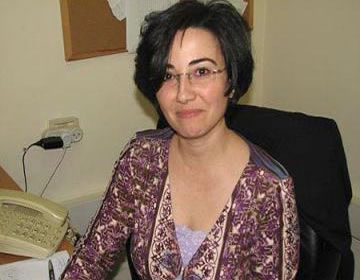Haneen Zoabi -- "Who am I?"
By Tara Graham

(Photo Credit: Creative Commons)
"I am both a Palestinian and Israeli citizen," Haneen Zoabi says forcefully. She pauses for a moment and then resumes, "but in a state that doesn't take my citizenship seriously."
The 41-year-old legislator, who was voted into the Knesset in March of 2009, takes a moment to allow the group to fully comprehend her statement.
"I am not an Israeli Arab," Zoabi continues. "My people were here before Israel. I am a Palestinian, and I would like to be called such. The Jews cannot decide my identity."
Zoabi, a representative of the National Democratic Assembly, is sitting before a round table of journalists in a small, cramped government office.
"When I was a young child living in Nazareth, I used to ask my mother, 'Who am I?'" Zoabi says. "And she couldn't give me a good answer. She would simply say, 'We live in Israel.'"
The plight of Arab children in Israel -- the confused identity handed over to them -- is no small matter, Zoabi explains in heated frustration.
"When I was young, my first experience with politics was in the history books," she recalls. "There is no mention of Palestine or Arab history in those books."
Zoabi wonders aloud how this can be true when 93 percent of the land confiscated by the Israeli government from 1948 to the present originally belonged to Palestinian Arabs. The state destroyed 538 Palestinian villages in the Arab-Israeli War, she says, and expelled around 650,000 Arabs in the process. Over the course of 62 years, the state has built 600 cities for the Jews, she cites, and zero for the Arabs. How is all this history not in the books, she asks in her booming voice.
"The Zionist ideology encourages the Jews to confiscate the maximum amount of land here, keeping as few Palestinians on that land as possible," she says. "This is a racist ideology, a very, very racist ideology."
The discrepancy in media attention only perpetuates the Israeli misunderstanding of the Arab population, Zoabi says. Israeli media devotes only two percent of its coverage to Arabs and 75 percent of that coverage is negative.
"Don't say this is a democracy," she warns, pointing out that Arabs hold only 6.7 percent of all government jobs in Israel, only 19 percent of Arab women are employed and only 8 percent of the national budget is invested in Arab villages.
Furthermore, around 8,000 Arab houses currently face demolition threat because the state says these houses were illegally built, "but they've never given us permission to build," Zoabi explains in an exasperated tone.
The result is that nearly half of the existing Arab villages aren't registered with the Israeli Ministry of the Interior, meaning they're deprived of much-needed funding for schools and industry.
"I am here in government to send a message that the Palestinians have accepted that we are citizens of Israel," Zoabi says. "Problem is: the state can't accept the fact that we are citizens and that the Israelis and Palestinians must live equally."
Zoabi supports a two-state solution consisting of one Palestinian state and another Israeli state that's inclusive of both Jews and Arabs. But she's afraid a third intifada will hit before a solution is ever reached.
"I just want Israel to recognize that the Palestinians are not strangers," she says. "We are an indigenous people. And this is our homeland."
